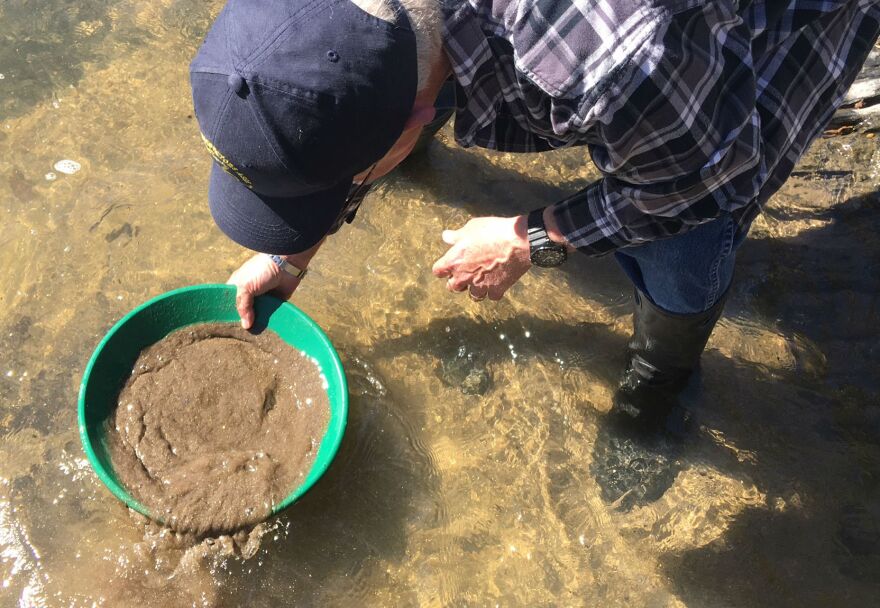All of the recent rain and snow in California is good news for farms and cities. The runoff flowing from the Sierra Nevada is so strong this year that’s it's moving huge boulders and tons of earth down rivers. That means gold is on the move as well and as Valley Public Radio’s Ezra David Romero reports that has gold prospectors on alert.
Larry Riggs and his friends are hunting on a piece of private property near Oakhurst. There are no guns or fishing poles present. Just shovels, plastic bowls and buckets.
They’re panning for gold.
"You can feel the boulders hitting the ground within the river through your feet. That's how much water power is coming down." - Mark White
“There’s ounces and ounces of gold going through right now,” says Riggs.
At the moment they’re spread out along a stretch of the Fresno River that cuts through the 80 acres. Riggs is having some luck.
“That’s a piece of gold, that little speck,” says Riggs. “I’ve had three pans and I’ve found three or four pieces of gold.”
Riggs has been gold prospecting since he was six and now he’s 69. He’s the claim director for the 900 member Central Valley Prospectors club. They meet monthly, have several claims across the state and host educational events at schools.
Riggs says the group is the largest nonprofit club like it in the US. And this year he says gold prospectors are out in force. The reason? All the runoff from the Sierra Nevada is creating perfect conditions to find gold.

“You can feel the boulders hitting the ground within the river through your feet,” says Mark White, president of the club. “That’s how much water power is coming down. Anytime you have that hydro movement you have gold movement, you have things breaking loose.”
He says after wet years prospectors often find a lot of gold. The crew hasn’t found large nuggets of gold yet this season, but Larry Riggs’ wife Kathy has found a lot of flakes. She says every flake is worth it because gold is worth around $1,200 an ounce. She says there’s a couple hundred women in the club and says often they’re better at gold prospecting than men.
"What you're looking for is to separate the black sand and hopefully find a little bit of gold. There was one little tiny itty-bitty piece in there." - Kathy Riggs
“I don’t know if it's because we like jewelry or what, but there’s a good sense of where it is,” says Kathy Riggs. “We used to have races to find out who would find the most gold. Usually I would win because he goes by science and I go by feel.”

To pan for gold Kathy Riggs is using a green plastic pan about 10 inches wide with three ridges on one side. On top of it she sits a metal net where she sifts wet dirt from the rocks. She’s digging where the water’s calm near the edge of the river.
“You always look at this because you may have what’s called a picker,” says Kathy Riggs. “That would be a piece of gold to stay in the classifier and not drop into the pan.”
After she gets through the rocky top layer she slowly shakes it underwater to get rid of all the fine layers of dirt and rocks.
What she’s eventually left with is black sand and little flecks of gold. Instead of sifting through the sand for gold, Kathy takes it home and sorts it out there.
“What you’re looking for is to separate the black sand and hopefully find a little bit of gold,” says Kathy Riggs. “There was one little tiny itty-bitty piece in there.”
When the river dies down later this summer the Riggs say prospectors will search in the center of the river for gold. Larry Riggs says often that’s where the nuggets are, but at the moment he says with the high floodwaters that’d be very dangerous and isn’t advised.

As the crew is teaching me how to pan for gold the clubs director warns me about something. I might get gold fever. That’s where people do crazy things for gold. Mark White says people have murdered each other over the precious metal and not just during the gold rush era, but today.
“It can get real ugly real fast the bigger the gold,” says White. “Nowadays it’s a little bit better, but back in the old days they would just drop you and take it. You don’t want to be bragging around too much or strutting too much, but you do want to come out and enjoy yourself.”
And when I finally get the hang of it and get rid of all the rocks and extra dirt out of my pan I spot two tiny flecks of gold. And Riggs, the old timer, asks me a question. “How did you feel when you first saw it?”
I had a little rush and he “walked away I was like I have gold fever.”
Riggs swears that I’m now addicted. He might just be right.






